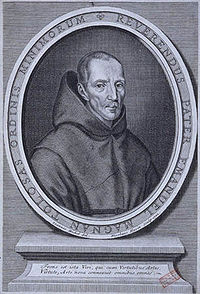
Emmanuel Maignan
Encyclopedia

Toulouse
Toulouse is a city in the Haute-Garonne department in southwestern FranceIt lies on the banks of the River Garonne, 590 km away from Paris and half-way between the Atlantic Ocean and the Mediterranean Sea...
, 17 July 1601; d. at Toulouse, 29 October 1676) was a French physicist and Catholic Minimite theologian.
His writings were particularly influential in Spain, where they were resisted by his fellow Minim Francisco Palanco.
Life
His father was dean of the Chancery of Toulouse, and his mother's father was professor of medicine at the University of ToulouseUniversity of Toulouse
The Université de Toulouse is a consortium of French universities, grandes écoles and other institutions of higher education and research, named after one of the earliest universities established in Europe in 1229, and including the successor universities to that earlier university...
. He studied the humanities at the Jesuit college. At the age of eighteen he joined the Order of Minims. His instructor in philosophy was a follower of Aristotle
Aristotle
Aristotle was a Greek philosopher and polymath, a student of Plato and teacher of Alexander the Great. His writings cover many subjects, including physics, metaphysics, poetry, theater, music, logic, rhetoric, linguistics, politics, government, ethics, biology, and zoology...
, but Maignan soon began to dispute and oppose all that seemed to him false in Aristotle's teachings, especially of physics. He preferred Plato
Plato
Plato , was a Classical Greek philosopher, mathematician, student of Socrates, writer of philosophical dialogues, and founder of the Academy in Athens, the first institution of higher learning in the Western world. Along with his mentor, Socrates, and his student, Aristotle, Plato helped to lay the...
to Aristotle.
He mastered the mathematics of the day, practically without aid from anyone. At the end of a few years his ability was recognized by his superiors and he was given charge of the instruction of novices. In 1636 he was called to Rome by the general of the order to teach mathematics at the convent of the Trinità dei Monti. There he lived for fourteen years, engaged in mathematics and in physical experiments, and publishing his work on gnomonics and perspective
Perspective (geometry)
In geometry, two triangles are perspective if, when the sides of each triangle are extended, they meet at three collinear points. The line which goes through the three points is known as the perspectrix, perspective axis, homology axis, or axis of perspectivity. The triangles are said to be...
.
In 1650 he returned to Toulouse and was made provincial. When his three years were up, he was glad to devote himself entirely to his studies. When Louis XIV, having seen his machines and curiosities at Toulouse, invited him to Paris, in 1669, through Cardinal Mazarin, he begged to be allowed to pass his life in the seclusion of the convent.
Works
His published works are:- "Perspectiva horaria sive de horographia gnomonica tum theoretica tum practica" (4 vols., Rome, 1648);
- "Cursus philosophicus" (1st ed., 4 vols., Toulouse, 1652; 2nd ed. with changes and additions, Lyons, 1673);
- "Sacra philosophia entis supernaturalis" (Lyons, 1662, 1st vol., and 1672, 2nd vol.);
- "Dissertatio theologica de usu licito pecuniæ" (Lyons, 1673).
This dissertation seemed to authorize usury
Usury
Usury Originally, when the charging of interest was still banned by Christian churches, usury simply meant the charging of interest at any rate . In countries where the charging of interest became acceptable, the term came to be used for interest above the rate allowed by law...
and was therefore censured by a number of bishops.

